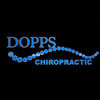T2 – Heart & Circulation Health: Chiropractic Care in Overland Park
- Dr. Rory Dopps

- Nov 17, 2025
- 4 min read

Understanding the T2 Nerve and Cardiac Connection
Your thoracic spine contains 12 vertebrae (T1–T12). Each vertebra protects spinal nerves that carry messages between your brain and vital organs. The T1 and T2 nerves travel into the top of your chest and into your arms and hands my.clevelandclinic.org. Meanwhile, the T3–T5 nerves control the rib cage, lungs and diaphragm my.clevelandclinic.org. These nerves also form part of the cardiac plexus, a network of autonomic nerves that regulate your heart rate and vascular tone. Radiology references note that sympathetic cardiac nerves arise from the T1–T4 (and partly T5) spinal segments radiopaedia.org and travel through the cardiac plexus to the sinoatrial and atrioventricular nodes radiopaedia.org.
When the T2 nerve or its surrounding tissues become compressed or irritated—a condition known as thoracic radiculopathy—it can cause pain, numbness and tingling in your chest or back my.clevelandclinic.org. Thoracic radiculopathy often causes pain around the chest, including when you breathe in or out my.clevelandclinic.org, and because it wraps around the torso it can mimic serious cardiac or pulmonary problems. If you experience new chest pain, trouble breathing or numbness, always consult a healthcare provider my.clevelandclinic.org.
How Chiropractic Care Can Help, T2 – Heart & Circulation Health

Chiropractic care focuses on restoring proper alignment and motion in your spine to relieve nerve interference and improve nervous‑system communication. Misalignment or restricted movement in your thoracic spine can irritate the T2 nerve and neighbouring segments. By using gentle, specific adjustments, a chiropractor seeks to reduce pressure on the nerve roots and improve joint mobility. When nerve function normalizes, muscles and organs controlled by those nerves may function more efficiently.
Research exploring the autonomic effects of spinal manipulation is still emerging. A randomized, cross‑over study compared upper and lower cervical spinal manipulative therapy and found that upper cervical adjustments increased parasympathetic activity and decreased systolic blood pressure, while lower cervical adjustments increased sympathetic activity pmc.ncbi.nlm.nih.gov. Although this study focused on the cervical spine, it suggests spinal adjustments can influence autonomic balance. Another pilot trial by the University of Chicago Medical Center showed that a single atlas (C1) adjustment significantly lowered blood pressure, with reductions comparable to taking two blood‑pressure medications sciencedaily.com. These findings indicate that restoring spinal alignment may help regulate vascular tone and heart rate, though more research is needed.
In practice, patients with thoracic radiculopathy often report relief from chest pain, improved posture and easier breathing after thoracic and cervical adjustments. Dr. Rory Dopps will perform a thorough examination—including posture analysis, range‑of‑motion testing and potentially digital X‑rays—to determine if a T2 misalignment is contributing to your symptoms. If chiropractic care is appropriate, treatments may include manual adjustments, instrument‑assisted techniques and supportive exercises. As always, chiropractic is part of a holistic approach and should not replace medical care for cardiac conditions.
Targeted Nutritional Support for Heart & Circulation

Proper nutrition provides the building blocks for healthy blood vessels, nerves and muscle tissue. Alongside chiropractic care, consider these practitioner‑selected supplements from our Designs for Health dispensary:
Supplement & Link | Key Benefits |
Provides 100 mg of ubiquinol CoQ10 (as DuoQuinol™) and geranylgeraniol to support healthy cardiovascular function, energy production and antioxidant status. CoQnol helps maintain cellular energy in heart muscle and supports blood pressure already in the normal range. | |
A targeted formula of bonito peptides and grape‑seed extract designed to support normal blood pressure and vascular tone. Bonito peptides mimic natural angiotensin‑converting‑enzyme inhibitors, while grape‑seed polyphenols provide antioxidant protection. | |
Delivers a high‑potency balance of EPA (600 mg) and DHA (400 mg) in each 2‑softgel serving to support heart health, brain function and a healthy inflammatory response. Omega‑3 fatty acids are essential for maintaining healthy blood vessels and reducing triglycerides. |
Before starting any supplement, consult your healthcare provider to ensure it’s right for your needs, especially if you take blood‑pressure medication or anticoagulants.
Lifestyle Tips for a Healthy Heart and Circulation

Beyond adjustments and nutrition, daily habits play a major role in heart and circulatory health. Try integrating these tips:
Practice good posture: Sitting and standing tall reduces stress on your thoracic spine and rib cage. Simple postural corrections can relieve tension in the chest and shoulders.
Move regularly: Engage in moderate aerobic exercise (e.g., brisk walking, swimming, cycling) for at least 150 minutes each week. Exercise improves circulation, strengthens the heart and boosts mood.
Breathe deeply: Diaphragmatic breathing exercises expand your rib cage, improve oxygenation and encourage relaxation. This can ease thoracic stiffness and support parasympathetic activity.
Manage stress: Chronic stress elevates blood pressure and tightens muscles. Incorporate mindfulness, meditation, hobbies and adequate sleep to calm your nervous system.
Eat for your heart: Focus on whole foods—plenty of vegetables, fruits, lean proteins, whole grains and healthy fats (like omega‑3‑rich fish and nuts). Limit processed foods, sugar and excessive sodium.
Stay hydrated: Adequate water supports blood volume and nutrient transport. Aim for at least eight 8‑ounce glasses of water daily (adjust for activity and climate).
If you experience chest pain, shortness of breath or persistent discomfort, seek immediate medical attention to rule out serious conditions.
Ready to Take the Next Step?
Your heart and circulation deserve personalized care. Whether you’re dealing with chest discomfort, high blood pressure, fatigue or simply want to support your overall cardiovascular wellness, Dr. Rory Dopps can help. Schedule your chiropractic consultation online at Dopps Chiropractic in Overland Park and start your journey toward a healthier spine and heart. Remember: pain stops at Dopps!




Comments